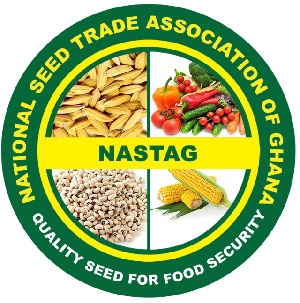 The production of 7.3 percent of certified seeds will be increased from 27 to 28 by 2019.
The production of 7.3 percent of certified seeds will be increased from 27 to 28 by 2019.
The National Coordinator of National Seed Trade Association of Ghana (NASTAG), Thomas Havor, has projected to increased certified seed production in Northern Ghana by 40 percent if research efforts were boosted and focused on the production of quality seeds.
Currently, figures by the Agriculture Technology Transfer (ATT) project reveals that the use of certified seeds in the Northern Region is only at 7.3 percent, this he said is not encourage and expressed the hope of scaling the production of certified seeds to either 27 or 28 by 2019.
Mr. Havor made these statements at the 2nd Northern Ghana Seed Platform Organized by the Feed the Future USAID Agriculture Technology Transfer (FTF-USAID ATT). The forum brought together participants including farmers, seed producers in the Northern, Upper East and Upper West region in the seed production value chain and members of the National Seed Trade Association of Ghana (NASTAG).
The forum was to take stock, access shortfall and the way forward in the seed production sector in the three regions of the north.
Accordingly, he stated that the 40 percent projection could also be realized when efforts were made by government and all its stakeholders to make available quality seeds and good application of the requisite agronomic practices coupled with simple innovative technologies.
Mr. Havor appealed to all seeds producers in the northern part of Ghana to take very good advantage of the National Planting for food and jobs campaign announced by the minister of Food and Agriculture recently during his verting.
As a result, he said the ATT project has made available seeds vans to Agro dealers to reach out to farmers in communities to get access to certified seeds.
Dr. Gary Mullins, Chief of Party, Ghana Agriculture Technology Transfer (ATT) Project in an interview with the media revealed that the organization intends to sponsor over 70 individual farmers this year through training to produce certified seeds to meet the demand in the market.
He said they have a long term goal to meet over 40 percent of the three varieties of crops thus maize, soya bean and rice and 30 percent this year.
The Feed the Future USAID Agriculture Technology Transfer (FTF-USAID ATT) is a five year project funded by the US Agency for International Development’s Ghana Mission (USAID/Ghana), to increase the competitiveness of rice, maize, and soya value chains to foster broad-based and sustained economic growth through the increased availability of Agricultural technologies for sustained productivity growth in Northern Ghana.
The program works in the Ghana FTF intervention zone, which covers the three regions of the north.